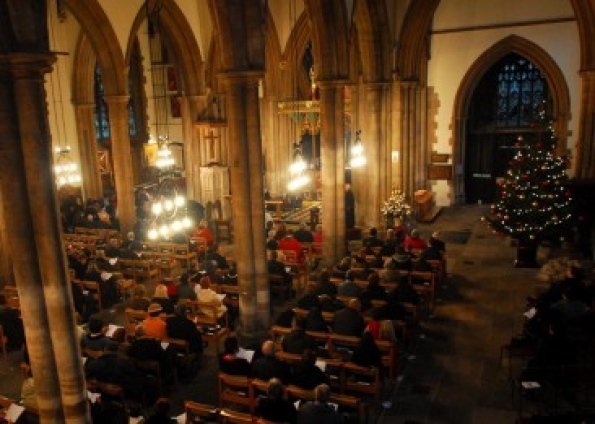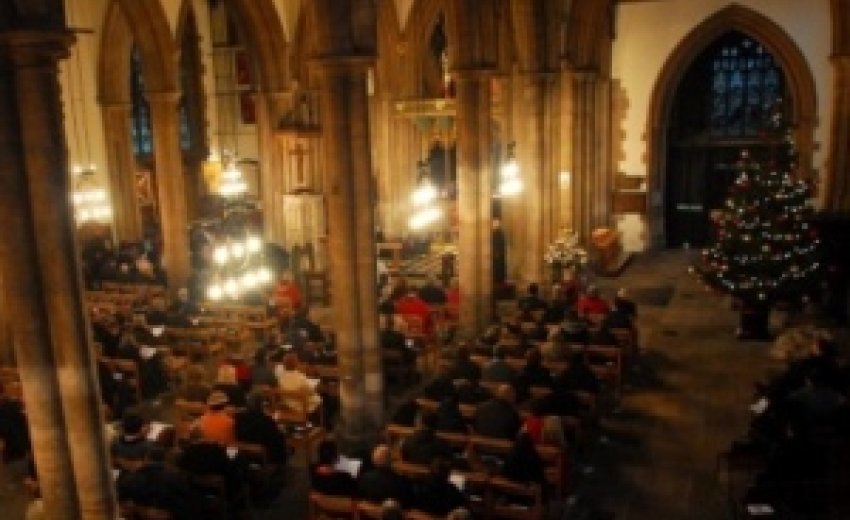 |
| Annual carol concert at St Pauls church, Bedford |
A selection of Christmas messages supplied via Bedford Council of Faiths.
Jesus’ humble birth in a smelly cowshed hardly suggested the birth of someone important. Time proved otherwise.
The editor of the Quaker weekly, The Friend, quoted Giles Fraser (who resigned from St Paul’s Cathedral staff when they wanted to evict the camp outside) that Jesus’ life represented holiness redefined as justice rather than the traditional view of it as pristine otherness.
St Paul’s Cathedral before the messy encampment outside could be seen as a symbol of pristine otherness, but the camp has invited it to stand up for justice in the City of London, even if that might offend wealthy donors to its expensive upkeep.
The Friend editor warned that there is a danger of spirituality becoming too associated with ‘my own journey and my own fulfilment’. Spirituality is not just about individual fulfilment; it is also about how the individual relates to the larger community. Many individual Quakers have visited the tented community and been impressed by its courageous lobbying against the unsustainable, the undemocratic and the unjust undermining our society.
If this view of spirituality reflects your feelings, you may find kindred spirits among Quakers. Come and meet us on Sunday at 10.30am or 12.30pm on Thursday at 5 Lansdowne Road, Bedford.
First Church of Christ, Scientist, Bedford
The Bible story is familiar to many: Mary and Joseph’s receptivity to messages from angels; scholars from the East led by a star; shepherds – tough, strong, fearless men – who, watching over their flocks, listened to the angel-song, received the message and hurried to the stable.
What drew them to the Christ? The conviction that something of huge importance was happening – the glorious gift of he who would teach all humanity the truth about man’s relationship to God, our divine Parent. That God is Love: that His entire creation is loved, cherished, never forsaken, tenderly cared for. Jesus’ understanding of this underlying principle enabled him to live a life of love, comforting and healing those who sought the truth he taught.
Mary Baker Eddy, the Discoverer of Christian Science, writes that the Christ is “…the true idea voicing good, the divine message from God to men speaking to the human consciousness.”
The timeless message of God’s omnipotent love and care for each and every one of us – not just at Christmas time but throughout all time – is a permanent, irresistible, powerful, steady assurance that we can trust.
In the words of the Bible: “Thanks be to God for His unspeakable gift.”
Norman Ash, assistant to the educational secretary at The Guru Nanak (Sikh) Gurdwara in Queens Park
This season of celebration, commemorating the birth of Jesus Christ, is an opportunity to remember how he lived his life and what he stood up for.
Jesus acted selflessly in service to others, caring nothing for personal possessions.
Jesus shared what he had with all equally, treating all the same, washing their feet, serving them meals and eating together with them. Sikhs share this calling for selfless service (Sewa), non-attachment to worldly things and non-discrimination.
Jesus stood up for truth, peace, the downtrodden, goodwill and service to all, he wished no one harm, only true benefit. These are all aspirations that Sikhs share and try to uphold throughout their own lives, continuously, day and night.
Sikh teachings say “Truth is high, but higher still is Truthful living.” By living the Truth and sticking to it, a person cannot be found wanting, no matter what challenges may confront them. We are all only in this world a short while (Sikhs view it as travelling through life – a passing play), they believe we choose our own destiny, through the way in which we live.
Maybe, through us all adopting a less ‘self-centred’ way of life, sharing common benefits together, we would all find much in common, with all our real needs catered for and all ‘financial challenges’ disappearing …as if they never existed in the first place?
